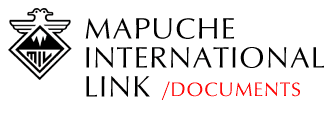
 |
|
|
| Home
| Front Page
| News
| Articles
| Documents |
Environmental
| Archive
| Discussion
Point Events Calendar | Links | About Us |
|
Intervention of Werken Reynaldo Mariqueo in the Human Rights Council of the UN Human Rights Council Agenda Item 3 Promotion and Protection of all human, civil, political, economical, social and cultural rights, including the right to development. Intervention of the International Society for the Protection of Threatened Peoples Thank you Mr President, Distinguished delegates, ladies and gentlemen. Many thanks to the special Reporter, Mr James Anaya for his detailed report on the situation of human rights and the fundamental freedoms of the indigenous peoples. Mr President, 50 years after the Independence of Chile and Argentina from Spain in 1810, both states launched a systematic and brutal military campaign against the independent Mapuche Nation with the aim of occupying and appropriating its territory. Since then, however, the Mapuche have maintained their continual fight for the recovery of their sovereign rights, including the right to run their own political, economic and cultural affairs and for self-determination. As part of the process of “integration” into the new republics, the Mapuche were deliberately excluded from all participation when decisions were made on issues concerning them. Through an assimilation process, resulting in the plundering of their natural resources and the negation of their basic rights, they were condemned to a slow and sustained genocide to wipe out their people. The ethnic cleansing of the ancestral territory of the Mapuche Nation, was advantageous for the non-Mapuche colonies, yet here the conflict began. The current democratic government refrains from constructively addressing the conflict. On the contrary, like the policies implemented by past administrations, they also use repressive techniques and strategies destined to silence the legitimate demands of our people. The Chilean neo-liberal economic development and globalisation has exposed the natural resources of the Mapuche to indiscriminate proportion. The development projects and infrastructure are implemented in their ancestral territory without the prior free and informed consent of its rightful owners, required by international law – in particular articles 26 and 32 of the UN Declaration on the Rights of Indigenous Peoples. This situation affects the Mapuche communities located today, under the administration of the Chilean and Argentinean States . In Chile , the legitimate protest of the Mapuche is criminalized and their authorities and leaders strongly repressed, preventative detention is prolonged for many months, sanctioned by courts under outdated civil or military laws. The courts still enforce laws and repressive techniques which were used during the military dictatorship of General Pinochet. The use of this law has been widely condemned by international human rights organisations worldwide. Mr President, there are extreme cases of political persecution against leaders which extends to their entire family. Such is the case of Lonko Juana Calfunao, who has been imprisoned in Temuco since November 2006 together with her husband Werker Antonio Cadin under the retrospective application of laws. All of the family have suffered in several periods of detention, object of judicial set ups. The situation of this family is so serious that it was necessary to send the youngest daughter (R.C.C.) of barely just 10 years of age out of Chile to seek political refuge. The Chilean State can't guarantee her physical and psychological wellbeing, as is also the case for other Mapuche children from communities involved in territorial conflict. Thank you very much My President,
Geneva 16th of September, 2008 _______________________ Translated by Elise Saunders
|
| |
||
|
||